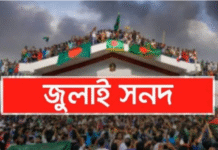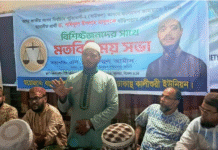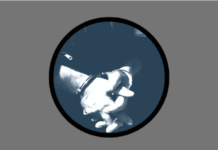“It’s burning. O Allah! It’s burning.”
Groaning in pain, Salauddin Palash, 36, blurted those words repeatedly, with his bandaged hands lifted upward at the burn unit of Dhaka Medical College Hospital on Tuesday.
Standing close, his wife Nasrin Akter was waving him with a hand-fan in her naive effort to ease the excruciating pain her husband had been in since January 23 when he was burnt along with 27 bus passengers in the Jatrabari arson attack.
With his face burnt and left leg broken, Palash, a resident of Barpa of Kanchpur, was shifting restlessly in his bed. Seeing a female doctor pass by him, he blurted again: “It’s burning, apa.” The doctor stopped and raised her hand with a gesture of assurance that everything would be fine, and then walked away.
Nasrin continued fanning, staring blankly at her husband on the first floor of the burn unit. “Please pray for my husband. We have two minor children,” she said weakly while her husband continued groaning.
Such cries, whimpers and agonised howls of the victims and their families were all around the burn unit. A thick smell of charred flesh made the air heavier.
Yeasin Arafat, another burn victim of the Jatrabari arson, was lying in his bed, throwing an empty look at the ceiling with pus oozing from his lifted hands, burnt yellow.
“Whenever I put my hands on the bed, they get wet with pus and cream,” he said.
Kazim Uddin too was moaning, continuously. “O ma, ma…it pains,” he was crying as his relatives shifted him in his bed. With the chest and hands bandaged, Kazim,
who had suffered burns in a petrol bomb attack on a train in Gazipur, sat up on the bed for taking a medicine, and then lay down again, moaning all the while.
The picture was more or less the same with other patients at the unit.
Doctors at the unit were struggling to cope with the increasing number of patients. The unit has already been overwhelmed with more than 500 burn patients against a capacity of 300 beds.
Of the patients, 110 were burnt in the ongoing blockade enforced by the BNP-led 20-paty since January 6. Of the 110, 60 are still undergoing treatment there.
The victims’ family members, who were leaving no stone unturned to save the lives of their dear ones, looked all stressed and exhausted.
A feeling of mental agony and uncertainty was etched into their faces. Many of them were weighed down by the question whether they would ever get back to normal life.
They, however, were disinterested to speak about the politics that caused all these arsons, leaving them in the lurch.
“What is the point of talking about politics? Do they ever care?” said a victim’s attendant in disgust on the first floor.
Sujon Sikder, brother of Arif Sikder, a burn victim of the Comilla arson attack, said, “If we speak of politics, our lives will be at risk.”
Just a few yards away, a mother was feeding his burnt son. She said, “We don’t know politics. Nor do we understand it. Please let us live.”
“Can they feel our pain?” she asked, referring to our politicians.
Source: The Daily Star









